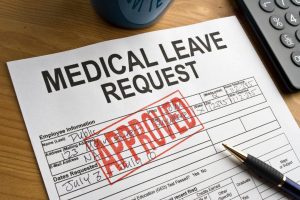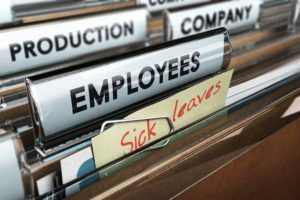FMLA requirements
Understanding FMLA requirements
 The Family and Medical Leave Act is a law that was passed in 1993 by the U.S. Department of Labor(DOL) that entitles eligible employees of covered employers to take unpaid, job-protected leave for specified family and medical reasons. It guarantees the continuation of group health insurance coverage under the same terms and conditions as if the employee had not taken leave. This either means returning to their prior position or returning to an equivalent position with similar pay, duties, hours, and benefits.
The Family and Medical Leave Act is a law that was passed in 1993 by the U.S. Department of Labor(DOL) that entitles eligible employees of covered employers to take unpaid, job-protected leave for specified family and medical reasons. It guarantees the continuation of group health insurance coverage under the same terms and conditions as if the employee had not taken leave. This either means returning to their prior position or returning to an equivalent position with similar pay, duties, hours, and benefits.
While FMLA leave is generally unpaid leave, employees may substitute unpaid leave for any sick leave they may have accrued.
An employee’s leave entitlement will reset every single 12-month period based on the FMLA calendar you’ve set. In some cases, employees may take intermittent leave over an extended period of time and could have to recertify documentation periodically.
Basic FMLA leave is available under two separate provisions. When Congress first passed the law, it provided up to 12 weeks of unpaid leave for three specific situations.
-
Self-care. Employees who suffer from a serious health condition may take up to 12 weeks of unpaid FMLA leave. This is the so-called self-care provision.
-
Birth or adoption. Employees can take FMLA leave following the birth, adoption, or foster care placement of a child.
- Care for a spouse or immediate family member. Employees may take FMLA leave to care for a spouse, parent, child, or other immediate family member suffering from a serious health condition.
Congress later amended the FMLA to cover military service member deployment and military family leave. They are eligible for two additional types of leave.
-
Military deployment. Employees may take up to 12 weeks of FMLA leave for qualifying exigencies when the employee’s spouse, son, daughter, or parent is on covered active duty or call to covered active duty status as a member of the National Guard, Reserves, or Regular Armed Forces. This includes providing childcare, attending military ceremonies, visiting with the servicemember during Rest and Recreation breaks, and taking care of legal matters related to the absence.
- Military caregiver leave. Employees can take up to 26 weeks of caregiver leave to care for a seriously injured or ill-covered servicemember.
Determining FMLA eligibility
Not all employers are required to provide FMLA leave, though many are. Let’s take a look at the basic FMLA eligibility requirements for employers.

The FMLA only applies to employers that meet one of the following criteria.
-
Private-sector employer, with 50 or more employees in 20 or more workweeks in the current or preceding calendar year, including a joint employer or successor in interest to a covered employer.
-
Public agency, including a local, state, or federal government agency, regardless of the number of employees it employs.
-
Public or private elementary or secondary school, regardless of the number of employees it employs.
An employee at a covered employer is eligible if the employee:
-
Has worked for the employer for at least 12 months. Breaks in service are allowed as long as they are for less than seven years.
-
Worked at least 1,250 hours of service for the employer within the last 12 months. Thus, some part-time workers are covered if their hours total 1,250 for the year
-
Works at a location where the employer has at least 50 employees within 75 miles.
For additional information on determining FMLA eligibility, refer to this FMLA eligibility checklist.
FMLA calendar year
The FMLA allows most employers to choose from one of four calendaring methods. The chosen method must apply to all employees equally. Employers may change their FMLA calendar year method by giving 60-days-notice to all affected employees. If the change deprives an employee of leave time or other FMLA benefits, the employee is entitled to the time/benefits under the original calendaring method. Leave initiated during the 60-day notice period must be calculated on the method most beneficial to the employee.
The four FMLA calendaring methods are:
- The calendar year.
- Any fixed 12-month “leave year,” such as a fiscal year, a year required by state law, or a year starting on an employee’s “anniversary” date.
- The 12-month period measured forward from the date any employee’s first FMLA leave begins.
- A “rolling” 12-month period measured backward from the date an employee uses any FMLA leave.
If the employer doesn’t choose a calendaring method, the employer must use the calendaring method most beneficial to the employee. So, if you haven’t already chosen a method, do so now. Otherwise, each time you process an FMLA leave request, you must calculate the entitlement four ways.
FMLA notice requirements
Employees must comply with their employer’s usual and customary requirements for requesting leave and provide enough information for their employer to reasonably determine whether the FMLA may apply to the leave request. Employee requests for leave generally must be made 30 days in advance when the need for leave is foreseeable. When the need for leave is foreseeable less than 30 days in advance or is unforeseeable, employees must provide notice as soon as possible and practicable under the circumstances.
When an employee seeks leave for an FMLA-qualifying reason for the first time, the employee need not expressly assert FMLA rights or even mention the FMLA. If an employee later requests additional leave for the same qualifying condition, the employee must specifically reference either the qualifying reason for leave or the need for FMLA leave.
All covered employers must display a general notice about the FMLA (an FMLA poster). Additionally, covered employers who have employees who are eligible for FMLA leave must:
-
Provide employees with general notice about the FMLA.
-
Notify employees concerning their eligibility status and rights and responsibilities under the FMLA.
-
Notify employees whether specific leave is designated as FMLA leave and the amount of time that will count against their FMLA leave entitlement.
FMLA reasons for taking leave
Qualifying serious health conditions
One of the primary reasons for taking FMLA leave is when an employee or family member suffers from a serious health condition. Defining what qualifies as a serious health condition, however, can be a bit challenging. The Department of Labor (DOL) defines a serious health condition as:
- Conditions requiring an overnight stay in a hospital or other medical care facility.
- Conditions that incapacitate you or your family member (for example, unable to work or attend school) for more than three consecutive days and have ongoing medical treatment (either multiple appointments with a health care provider, or a single appointment and follow-up care such as prescription medication).
- Chronic conditions that cause occasional periods when you or your family member are incapacitated and require treatment by a health care provider at least twice a year.
- Pregnancy (including prenatal medical appointments, incapacity due to morning sickness, and medically required bed rest).
Chronic illnesses are typically best handled using intermittent FMLA leave, but may also fall under the American’s with Disabilities Act.
 Baby bonding & foster care
Baby bonding & foster care
FMLA leave can be taken after the birth of a child for bonding, but also after adoption or the placement of a child from foster care. Typically this leave must be taken in an entire block at once. The employee need not take all 12 weeks of leave, but an employer is not required to, for example, allow the employee to take 4 weeks initially, and then another 4 weeks for baby bonding again after 2 months.
However, while not required to do so, employers may permit an employee to take intermittent FMLA leave in such situations. For example, an employee may wish to work a few days out of the week and take off others for an extended period of time or alternate weeks on and off. Leave for these purposes must be taken within 12 months of the inciting event.
Additionally, FMLA leave may be taken before the adoption of a child or the placement of a child in foster care. For example, an employee may need to attend court hearings, interview sessions, and engage in travel ahead of such events. These can be taken as FMLA leave but do count against their total FMLA use for that FMLA calendar year.
Learn more about taking FMLA leave for baby bonding.
 Taking FMLA for a family member
Taking FMLA for a family member
When taking FMLA for a family member, the employee may do so to aid in the care of a serious health condition.
They may use FMLA leave to:
- Care for their medical condition if the family member is unable to do so.
- Transport the family member to/from doctors appointments and other needs.
- Provide psychological comfort.
Under the FMLA, a qualifying family member is considered:
- A spouse (including same-sex spouses).
- A parent – biological, adoptive, step, foster, or other individual who cared for the employee when they were a child.
- A son or daughter. Biological relation is not required as long as the employee plays a role as a day-to-day caregiver or did so when the individual was a child.
You’ll note that FMLA leave does not by default extend to other familial relations such as siblings and cousins.
 FMLA for mental health
FMLA for mental health
Employees may also take FMLA for mental health issues. Many mental health conditions are covered by the FMLA, a common example being depression. This could include a significant hospitalization after a depressive episode or include intermittent leave used during periodic flare-ups. However, issues like depression and anxiety disorders also may count as ADA-covered disabilities that qualify for reasonable accommodations.
Finally, remind the employee that they’re subject to any call-off rules already in place. You can, and should, discipline employees who don’t call off as required even if they’re on FMLA intermittent leave.
FMLA for migraines
In most cases, employees can take FMLA for migraines. Migraine headaches typically meet the FMLA’s definition of a chronic serious health condition. These conditions must continue over an extended period of time and may cause episodic periods of incapacity. Migraines are more severe than regular tension headaches, often affecting sight. Sufferers may also experience nausea and vomiting, which can limit the ability to start or finish a scheduled shift. The employer should require employees to provide certification from their health care provider. The certification should specifically diagnose the condition. To qualify as a chronic condition, the employee must see a health care provider at least twice a year.
FMLA for addiction
Drug and alcohol addictions are serious health conditions as well as disabilities under the ADA. Treatment often includes periodic hospitalization for complications or relapses, as well as regular counseling sessions and medication checks. These addiction-related absences would qualify for intermittent leave. However, employers do not have to tolerate the use of controlled substances or alcohol use during work hours.
FMLA certification process
Given how many forms of FMLA leave are available, it’s sometimes hard to decide whether you have the right information. That’s why the FMLA certification process is necessary to confirm with a health care provider that a serious health condition exists.
The DOL Wage and Hour Division has standard FMLA certification forms for both circumstances. They’re available here and here. The care for a family member form includes questions for the employee. For example, it asks them to identify the person they will care for and the nature of the relationship. This helps you decide whether the employee is eligible for FMLA leave. It also asks what your employee will be doing to help. At the very least, these questions force employees to think through their plan. They’ll know their employer is scrutinizing the leave request.
Both forms require that a health care provider assess medical needs. The self-care FMLA certification also includes questions about whether the employee can perform the essential functions of the job. Include a current job description with the form for the doctor’s use.
Having FMLA guidelines that show you want to approve legitimate requests but won’t tolerate leave abuse discourages that abuse. Sometimes you may doubt the accuracy or authenticity of the FMLA certification form the employee returns. In that case, you have several options.
The first is to cast doubt aside and approve the leave.
The second is to contact the medical office that filled out the FMLA form and ask them to verify its accuracy. This can catch fraudulent submissions or alterations. Send them a copy of the form and simply ask whether they filled it out. You may not request additional medical information. You must make sure that the request comes from an HR professional, leave administrator, or health care provider. The request cannot come from the employee’s supervisor.
The third option is to request a second and third FMLA certification. If you take this route, you locate a health care provider you do not routinely use and have them complete a new FMLA certification. The cost is yours. If the first and second certifications don’t conflict, you must accept the result and grant leave. However, if they conflict, you can arrange for (and pay for) a third, final tie-breaking FMLA certification.
 How to investigate suspected FMLA abuse
How to investigate suspected FMLA abuse
Suspected FMLA abuse is a frustrating employment issue because it is so difficult to prove the abuse. Even suggesting that abuse may be a problem could give rise to a claim of FMLA retaliation or interference. By law, employers may not interfere with, restrain, or deny employees the right to exercise or attempt to exercise any rights provided by the FMLA, which may include refusing to authorize FMLA leave, or discouraging an employee from using such leave when he or she is entitled to do so.
Nevertheless, employers have been able to successfully defend claims of interference or retaliation when they acted on a bona fide belief that FMLA leave was not being used for its intended purpose. In many of the cases addressing terminations for FMLA fraud, the employer hired a private investigator to determine whether the employee was in fact abusing the leave. In other cases, reports from co-workers and customers or even postings on social media sites showing the employee doing something other than approved activities have been relevant.
However, be aware that some activities may not be inconsistent with the leave, even if the employee appears to be doing something other than resting at home. For example, going on a previously scheduled vacation may not be a violation. After all, an employee can likely sit on a beach recovering from surgery but probably shouldn’t be on a hiking trip. For that reason, if you do decide to check up on an employee you believe may be abusing leave, you should take care to act reasonably and respectfully, and ideally consult with counsel before you decide to take adverse employment action.
The use of the medical certification process is the biggest weapon employers have in combating FMLA abuse. It gives you the right to obtain information from the employee’s physician about the ailment and, at least for the first certification, to obtain a second or third opinion from an independent physician.
Learn more about FMLA retaliation and how to protect yourself from retaliation claims. Additionally, if you’re worried about the actions an employee is taking while on FMLA leave and wonder if they’re abusing such leave or not, take a look at our guide What can you not do while on FMLA.
FMLA return to work guidelines
When an employee returns to work, they must be given the same position they had originally or one considered equivalent. Let’s take a look at what an equivalent position looks like.
- Equal pay.
- Same or equivalent health benefits, and other benefits/perks.
- Equal job duties and working conditions.
- The same or a similar work schedule.
- Same or geographically proximate worksite.
- A similar opportunity for bonuses, profit-sharing, and other similar payments.
Get a detailed overview of FMLA return to work guidelines and what you need to know.
Fitness-for-duty certification
As a condition of restoring an employee whose FMLA leave was for self-care, an employer may have a uniformly applied policy or practice that requires all similarly-situated employees to obtain and present certification from the employee’s health care provider that the employee is able to resume work. This is commonly referred to as a fitness-for-duty certification. The employee has the same obligations to participate and cooperate in the fitness-for-duty certification process as in the initial certification process and is responsible for any associated costs.
If state or local law, or the terms of a collective bargaining agreement, govern an employee’s return to work, those provisions must be applied. Requirements under the Americans with Disabilities Act (ADA) that any return-to-work physical examination is job-related and consistent with business necessity also apply.
An employer may seek fitness-for-duty certification but it can only cover the health care condition that was the basis for FMLA leave in the first place. The certification must state that the employee is able to resume work. The FMLA designation notice must include the fitness-for-duty requirement or the employer loses the right to demand one. If the employer has provided a list of the essential functions of the employee’s job by no later than the time the designation notice is provided, then an employer also may require that the certification address those essential functions.
The employer may not delay the employee’s return to work pending receipt of the certification. Second or third opinions may not be required on a fitness-for-duty certification.
FMLA considerations for small businesses
While there are employee number requirements for businesses, small businesses may still in some cases be impacted by FMLA requirements. This is especially true if your business is a subsidiary of a larger company, or has multiple offices with only a few employees in an area. Additionally, if you employ a large number of part-time employees, you may technically qualify as part-time employees can be calculated into “full-time equivalents.”
If you include a promise of FMLA coverage in your employee handbook, but are not technically a covered employee, courts will still likely hold you liable for providing FMLA leave. Consider this when crafting your employee handbook and ensure not to overpromise on leave that you don’t plan to provide.
See more on FMLA for small businesses and how it may apply to you.

























